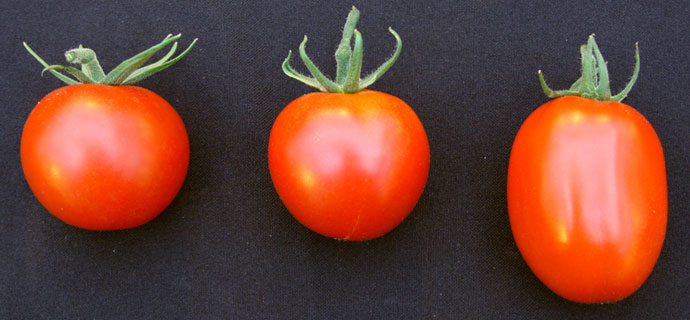|
Breeding with Green Gene mutations
May 2012
Picture this: a breeder has bred a tomato variety. Great taste
and very juicy. A valuable product of years of patient crossing
and selection. Difficult to improve. But in some aspects less
than ideal: a bit too tall, shelf-life not optimal. Here is
where breeding at the gene level comes in: individual genes that
control such less-than-ideal aspects can be altered in a non-GMO
way and selected for improvement. The result is a precisely
enhanced product that maintains the overall so appreciated
qualities of the original variety.
How does this work? Seeds of the tomato variety are treated with
a common chemical mutagen(s), a standard practice in traditional
plant breeding. This causes mutations in DNA in much the same
way as biological variation arises in nature, but at enhanced
speed. These seeds are planted, and the genes are screened for
mutations by high-powered DNA analysis machines. Seedlings with
the new mutations are picked and grown. Their performance with
respect to the quality of the tomato, is then carefully
evaluated in the course of a few generations, and an improved
version of the gene is selected to produce an enhanced tomato
variety.

 A
simple concept. However, its realization has awaited new methods
to deal with the massive screening work before arriving at a
dozen or so, promising new gene variants. These methods are now
available by KeyGene. Low cost DNA sequencing and smart ways of
growing, sampling and screening of large numbers of plants, have
made mutation breeding at gene level a practical reality. And
better: the approach works perfectly and is quick. Selection can
be done on young plantlets, whether from trees, vegetables,
cereals or any other crop. A
simple concept. However, its realization has awaited new methods
to deal with the massive screening work before arriving at a
dozen or so, promising new gene variants. These methods are now
available by KeyGene. Low cost DNA sequencing and smart ways of
growing, sampling and screening of large numbers of plants, have
made mutation breeding at gene level a practical reality. And
better: the approach works perfectly and is quick. Selection can
be done on young plantlets, whether from trees, vegetables,
cereals or any other crop.
Our knowledge of genes and DNA, and how this translates into the
properties of plants, has long been due for application to real
life challenges. With the breeding of genes, directly at the
level of DNA, a significant step has been taken to bridge the
gap that existed. Methodologically non-GMO, the breeding of
genes with mutations is poised for a green future.
For more information on KeyPoint® Mutation Breeding,
please contact:
Dr. Jeroen Stuurman, Senior Scientist,
js@keygene.com
|